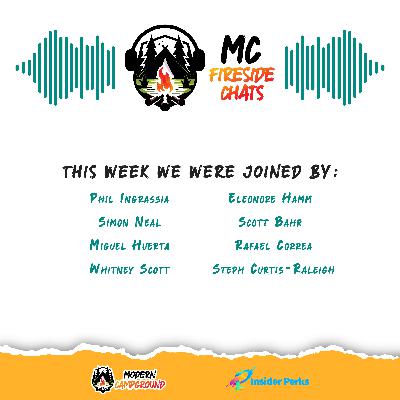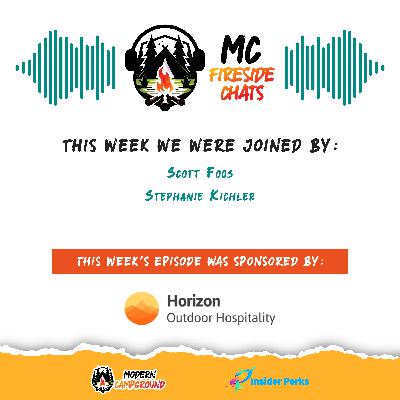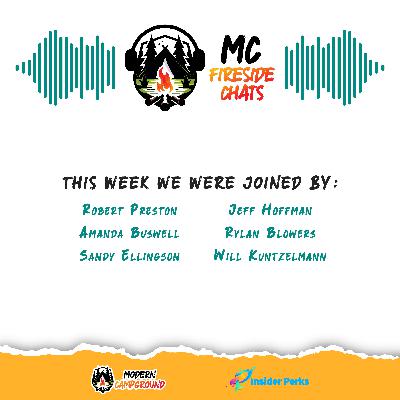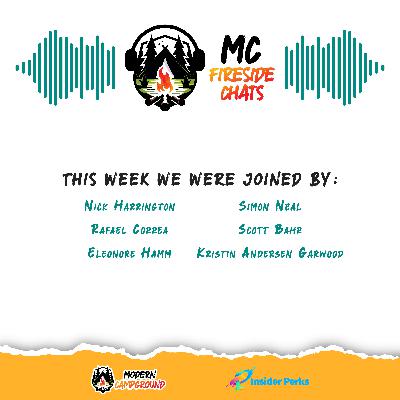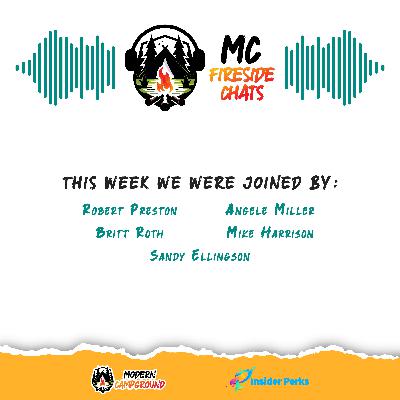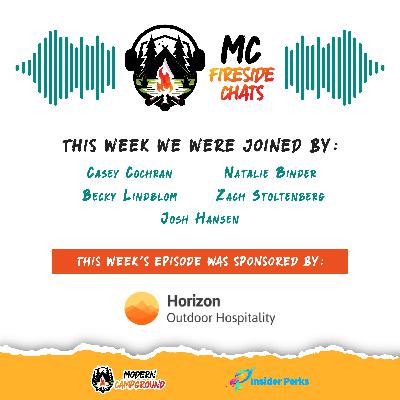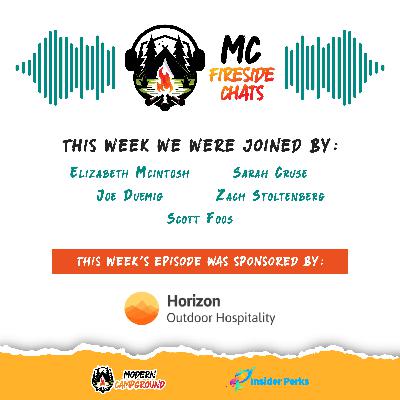MC Fireside Chats - September 3rd, 2025
Description
In a recent episode of MC Fireside Chats, host Brian Searl, from Insider Perks and Modern Campground, led a discussion on key trends and insights shaping the outdoor hospitality and recreation industry. The panel included industry experts such as Simon Neal from CampMap, Scott Bahr from Cairn Consulting Group, Eleonore Hamm and Phil Ingrassia representing the RVDA of Canada and the United States, respectively, and Rafael Correa from Blue Water. Special guests included Whitney Scott from Walden and Steph Curtis-Raleigh from the Glamping Show USA and Glamping Business in Americas.
The discussion kicked off with Rafael Correa's observation of a "late summer burst of consumer demand" across Blue Water’s portfolio, a welcome change after a relatively soft spring and early summer. The fall season is also trending positively, driven by "leaf peeping season, Halloween festivities and all that kind of good stuff."
Steph Curtis-Raleigh provided an international perspective, noting that bookings in the UK have been slower than usual this summer. She suggested that consumers might be looking for more unique offerings, a sentiment echoed by Scott Bahr, who referenced his research showing that while the desire for uniqueness has slightly waned from its peak, it remains a significant driver for a third of the market. This shift suggests a move away from the novelty of glamping toward a preference for unique experiences, amenities, and services.
The conversation then delved into the differences between the UK and U.S. glamping markets. According to Steph, the UK market is predominantly "mom and pop" businesses with a focus on a "lifestyle business" model, often with five or fewer units on a site. In contrast, the U.S. market, driven by its "entrepreneurial spirit," is characterized by bigger, more ambitious projects with a scaling mindset, often attracting investors from finance and tech backgrounds. Whitney Scott agreed, stating that while smaller operations are still the majority, their mindset from the start is often geared toward scaling. Rafael Correa added that in Blue Water’s RV resort portfolio, the glamping components have shown growth and resilience even when RV demand was softer.
Rafael also offered insights on differentiation for campgrounds and RV parks looking to integrate glamping. He highlighted that properties can differentiate themselves through location, service offerings, and amenities, citing the example of a Blue Water RV park in Luray, Virginia, with a water park, pickleball courts, and river access. For properties without the capital for large-scale amenities, he suggested focusing on the glamping unit itself, making it "super duper nice," or providing a high-touch, concierge-like experience that connects guests with local activities, a model he attributed to brands like Under Canvas.
Phil Ingrassia and Eleonore Hamm, from the RVDA, emphasized the strong connection between the RV and glamping industries. Phil noted that their research indicates about 11% of those who intend to buy an RV have previously rented an outdoor-related accommodation. Whitney Scott reinforced this, explaining that Airstreams and other RVs are a significant part of the glamping world and that the consumer is not "siloed," often exploring the outdoors through both glamping and RVing.
Miguel Huerta provided an update from Mexico, where he noted a 20% decrease in demand for hotel rooms, but only a 4% decrease for glamping. He sees increased interest from institutional players like Accor and stressed the importance of the "Five P's of Marketing"—place, product, promotion, price, and people—for success. He specifically warned against fighting for market share based on price alone.
The discussion also touched on the future of glamping, with Steph mentioning a steady growth in the luxury end of the market, which operates more like a hotel with spas and restaurants. She also noted a trend toward hands-off, technology-driven operations. Simon Neal shared a story from a European campground that leased space to two different glamping operators: one with mass-produced, closely packed tents and another with a limited number of high-quality, secluded units, both labeled as "glamping" but offering vastly different experiences. This, he said, highlights the importance of "small touches" and creating a "special feel."
Whitney Scott explained how Walden is helping the industry with data and intelligence, including a new product called "The Lot" that helps evaluate land for outdoor hospitality development. She also announced a new "consumer report for outdoor accommodations" that aims to simplify the buying process by categorizing the thousands of glamping products available. The sheer number of manufacturers, over 750 in the U.S. alone, highlights the creative and innovative nature of the industry.
The conversation also touched on the complex relationship between conservation and development. Whitney Scott spoke about Walden's work in tracking policy changes, such as the shortening of public response periods for developments on federal lands. She also highlighted the "Great American Outdoors Act," which funds conservation through oil money, and the growing trend of public-private partnerships, citing Amazon's investment in an RV park in Oregon. This led to a consensus that the industry's success is tied to striking a balance between development and respecting nature.
This discussion is important for the outdoor hospitality industry because it provides a comprehensive snapshot of its current health and future direction. It shows that while the market is maturing, with some segments experiencing a slowdown, there is a clear path to success through differentiation and a focus on the guest experience. The cross-pollination between the glamping and RV industries, as well as the growing professionalization of glamping, means that all sectors of outdoor recreation are interconnected. Understanding these trends, from consumer behavior to policy changes and new business models, is crucial for operators and investors alike to thrive in an increasingly competitive landscape.

